
Google plans to invest $1 billion to expand data center campuses in Northern Virginia this year, including two Loudoun County sites and a newly opened site in Prince William County.
Ruth Porat, the president, chief investment officer and chief financial officer of Google and its parent company, Alphabet, announced the funds on Friday (April 26) at the company’s Reston headquarters. They will bring Google’s total investment in the state to more than $4.2 billion to date.
“We’ve been here for five years with two data centers, and today, I’m really proud to announce that we’re investing an additional billion dollars in Virginia to expand those campuses and to add a third data center in Prince William County,” she said.
Google also introduced a $75 million artificial intelligence opportunity fund and an AI essentials class as part of two new workforce development initiatives geared towards helping employees and learners in Virginia benefit from new technologies.
“The intent is to ensure that everyone everywhere across Virginia and across the United States has the ability to get central training around AI,” Porat said. “How can we individually use it? How can we use it to support our businesses large and small?”
Through providing grants to best-in-class workforce development and education organizations, Google’s opportunity fund will equip more than a million people with fundamental AI skills.
“Google’s new AI Essentials course will teach people to use AI effectively in day-to-day work. In under 10 hours, people will get practical, hands-on experience using AI to help with work tasks through videos, readings, and interactive exercises,” a press release reads.
One of the fund’s first recipients, Syracuse University’s D’Aniello Institute for Veterans and Military Families (IVMF), will provide the new AI Essentials course and a Google Cybersecurity Certificate to its Onward to Opportunity participants in Virginia and across the country, according to the release.
Gov. Glenn Youngkin spotlighted the state’s technological advances, noting that Northern Virginia is the global hub for data centers with more development than the next five U.S. markets combined.
“With that comes tremendous synergy and an ecosystem that enables advanced development,” Youngkin said. “And so, Google’s $1 billion investment is a continued demonstration that that ecosystem is one worth investing in.”
Youngkin also said local communities are benefitting from data centers by paying $2.2 billion in wages and “a billion dollars in local revenue that funds an immense investment in schools and public services and social services.”
At the same time, some localities have moved to more closely regulate data centers in response to concerns about their neighborhood and environmental impacts. Fairfax County will hold community meetings starting this Thursday (May 2) to gather feedback on its proposed zoning changes.
In the press release on Google’s announcement, IVMF Executive Director Dr. Mike Haynie expressed appreciation for the technology giant’s continual backing.
“We are extremely proud to receive continued support from google.org that will allow us not only to continue to deliver the cybersecurity training that we’re currently delivering to the military connected community, but now also enhance the support we can provide to our nation service members, veterans and military spouses through AI training,” he said.
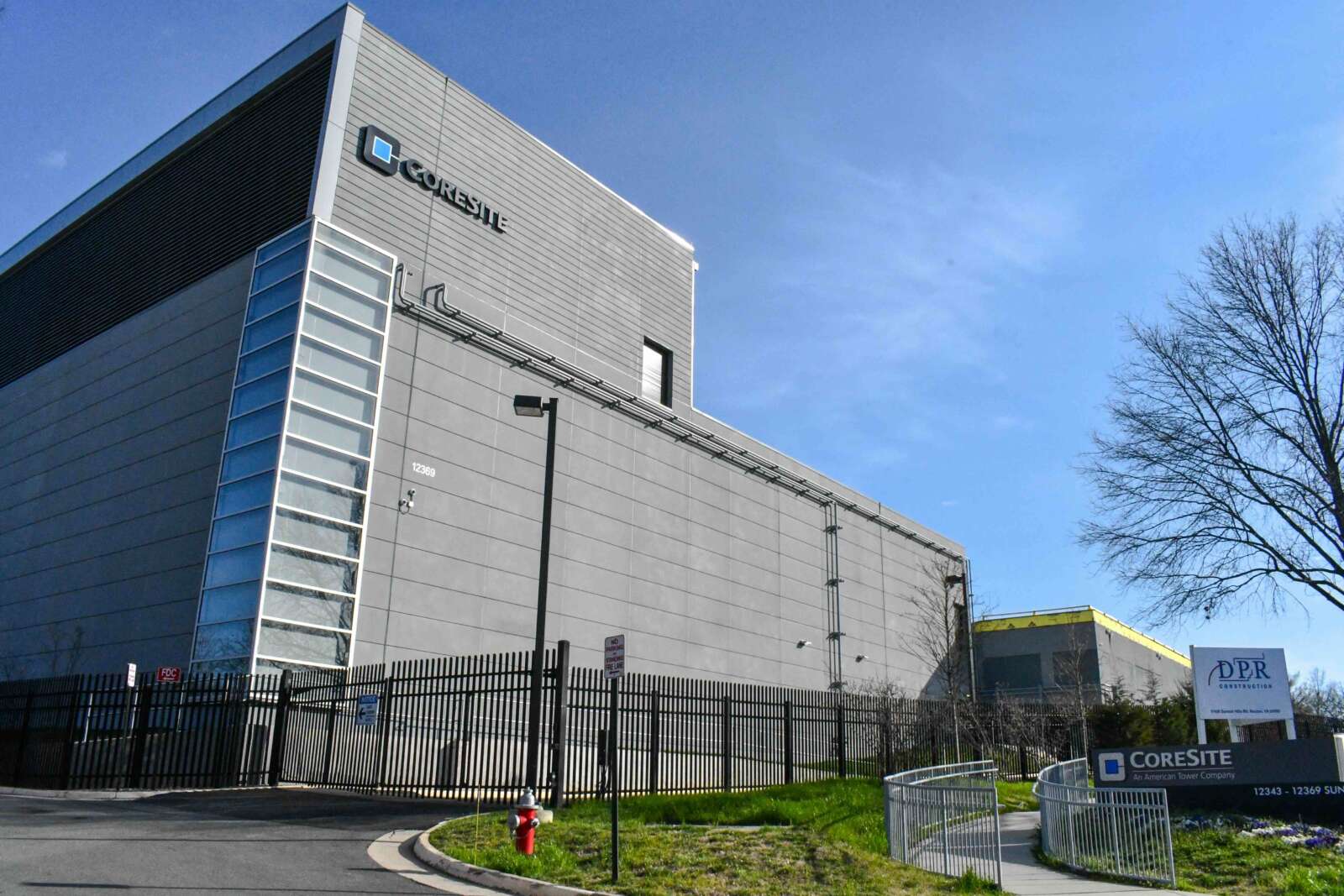
Amid a surge in digital storage demand in Northern Virginia, Fairfax County is drafting stricter zoning regulations to enhance oversight of data center projects.
On Tuesday (March 19), the Board of Supervisors directed staff to update the county’s zoning laws to include new data center development criteria, such as increased residential buffers, size limits, energy efficiency standards and a mandatory noise study in the site plan.
“The increasing demand for data centers and the increased understanding of their potential impacts reveal a need to consider strengthening our current regulations,” Sully District Supervisor Kathy Smith said, emphasizing the “urgency” of the new rules sought by the board.
Potential changes include new requirements for data center developments to receive a special exception in zoned areas where they are currently allowed by right, meaning they can be built without county board or planning commission approval or public hearings.
Last year, the board requested research, findings and recommendations from county staff on possible new guidelines for data centers, including ways to mitigate their environmental impact, criteria for locating facilities and the approval process for data centers.
The report presented to the board in January found that, while data centers bring advantages such as high-paying jobs and significant tax revenue, they have also encountered resistance from residents worried about the noise, greenhouse gas emissions, and high energy usage of the facilities.
At a land use policy committee meeting on March 12, the county supervisors signaled that they support staff’s recommendations for amending the zoning ordinance with higher standards.
Northern Virginia remains the world’s leader in data centers with 51 million square feet of space, per a recent JLL report. Fairfax County has roughly a third of the square footage of neighboring Loudoun and Prince William counties, the region’s epicenter of development.
Supervisors noted that there’s been significant community pushback against large projects like the recently approved Digital Gateway in Prince William. At Tuesday’s board meeting, Mason District Supervisor Andres Jimenez said the county needs to make sure “we’re putting data centers where they belong.”
“We have very few [data center projects] on the horizon that we know of, but it’s important that we get the protections right and the guidelines right, and the quickest way to do that is to get these zoning ordinance amendments approved,” Chairman Jeff McKay said.
The county staff recommendations
In terms of land use and site design, staff suggested that developers secure special exception approval from the county before constructing data centers in most commercial and industrial districts.
Staff also recommended that, in industrial districts where data centers are permitted by right, the county could proactively implement height and size limitations, along with minimum distances for equipment, such as generators, from residential zones.
Due to the swift pace of data center development, staff also advise collaborating with utility providers, including NOVEC and Dominion Energy, to evaluate how future development might affect energy demand. Read More

A committee in the Virginia House of Delegates on Friday advanced to the House floor a bill that would require localities to conduct water studies prior to approving data centers.
The bill, introduced by Del. Josh Thomas, a freshman Democrat who represents western Prince William County in the 21st District, would encourage local governments undergo site assessment to examine the effect of data centers on water usage, carbon emissions and agricultural resources.
Groups in Northern Virginia have long called for water studies to be conducted at the sites of proposed data centers, which use large amounts of liquid to cool the thousands of computers found within.
Data centers’ impact on local water sources was most notably questioned prior to the recent approval of the PW Digital Gateway tech corridor when the Fairfax County Water Authority sent a letter to Prince William County officials in 2022 asking that one be performed. To the dismay of anti-data center activists and environmental advocates, the county never performed a comprehensive study of the potential impacts on water quality in the Occoquan Reservoir from the Digital Gateway.
“This vote is a wake-up call to the data center industry,” Thomas said in a statement. The citizens of the Commonwealth, especially those in western Prince William County, have demanded more transparency in the data center siting process, and this bill is a critical first step. HB338 will encourage localities to analyze the impact of data centers on the community before projects are approved – not after.”
He continued, “While these centers can be an important source of tax revenue for localities, we cannot allow unrestrained development to harm our communities. I’m pleased to see that the General Assembly is weighing in on the issue of data center development. My colleagues and I will continue to push this legislation all the way to the Governor’s desk.”
The House Counties, Cities, and Towns Committee on Friday sent the bill to the House floor for a vote. Should the House approve the legislation, the Virginia Senate and Republican Gov. Glenn Youngkin must also sign off for it to become law.
Del. Ian Lovejoy, a Republican member of the committee who represents western Prince William, voted in favor of reporting the bill to the House floor.
“As co-patron of HB338 I was happy to see it move forward,” Lovejoy said in a text message. “As we await the outcome of the data center [study], any incremental gain in adding reasonable accountability to the data center siting process in a win.”
Democratic Sen. Danica Roem, a data center critic who also represents western Prince William and is a patron of the bill, also called the legislation a “win” and a step toward encouraging “local governments to complete work on application reviews prior to voting.”
Roem continued, “My hope is that this will lead our new Board of County Supervisors and staff to work collaboratively together to serve the best interests of Prince William County residents. This is the first step on the road to reform.”
Other Northern Virginia Democrats who are patrons of the bill championed its advancement to the House floor.
“The most important thing about sustainable development is to listen to our communities, and this bill makes progress in ensuring that big businesses listen to our communities as they develop technologies for the 21st century,” Democratic Del. Dan Helmer of Fairfax said in a news release from Thomas’ office. “We’re proud to be working with leaders at the local, state, and federal level to protect our climate and ensure our communities are heard.”
Del. Kannan Srinivasan, a Loudoun County Democrat, underscored the importance of evaluating the environmental impacts of data centers. “I am excited to support my fellow classmate as a Chief Co-Patron on his bill,” Srinivasan said in the news release.
This article was written by FFXnow’s news partner InsideNoVa.com and republished with permission. Sign up for InsideNoVa.com’s free email subscription today.
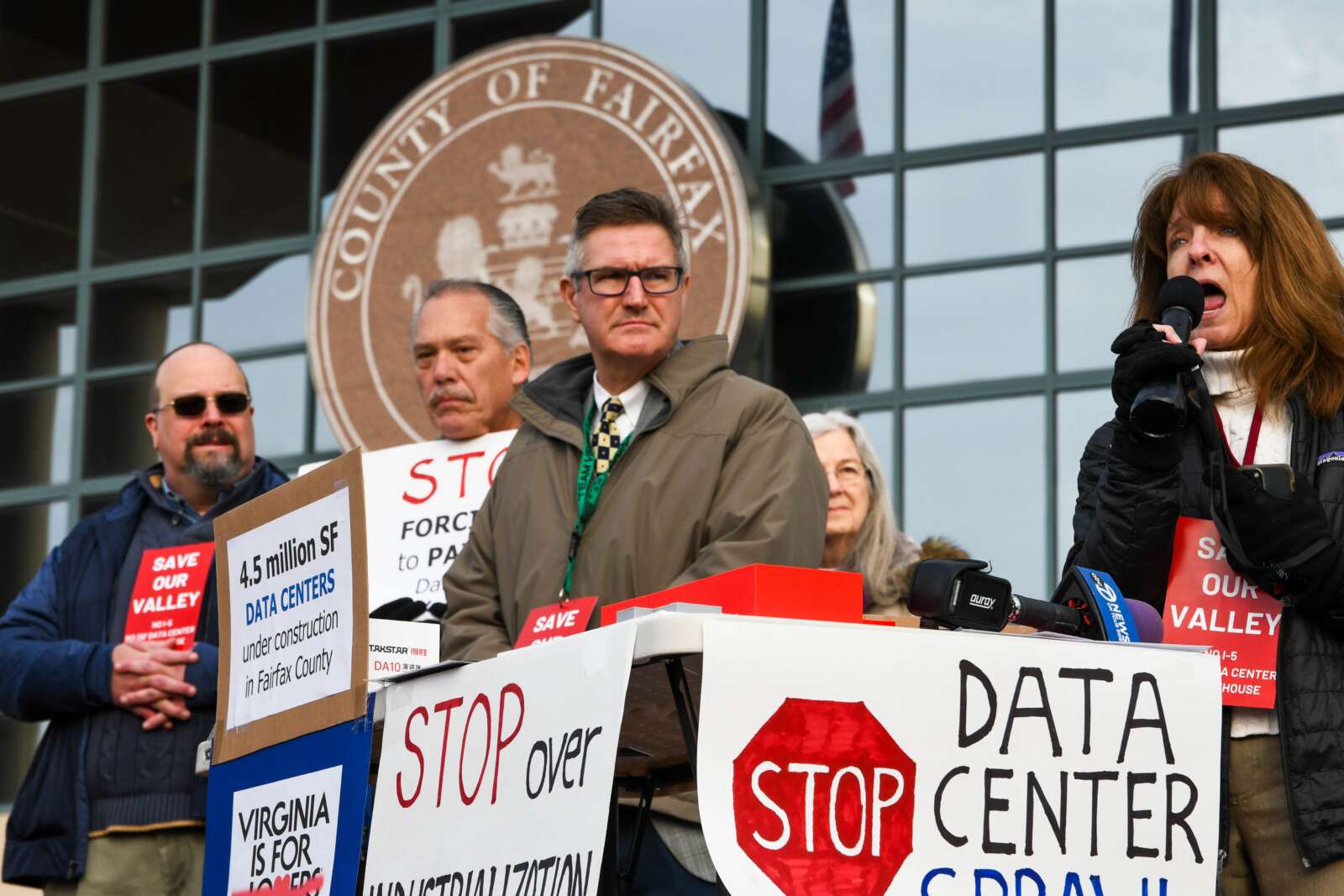
Fairfax County is getting a new warehouse or data center next to the Chantilly Auto Park — though unhappy residents and local stakeholder groups say they may take the issue to court.
After a lengthy public hearing on Tuesday (Jan. 23), the Board of Supervisors voted 8-1 to approve a rezoning of a 12-acre plot off Route 50 for industrial use. Springfield District Supervisor Pat Herrity was the sole dissenting vote, and Hunter Mill District Supervisor Walter Alcorn was absent.
PDCREF 2 Chantilly LLC, a developer affiliated with the D.C.-based firm Penzance, hasn’t yet settled on a definite plan for the site. Its application to the county included options for a 150,000-square-foot warehouse or a 402,000-square-foot data center, with heights between 75 and 110 feet.
Twenty-three individuals, many of them residents of the Pleasant Valley neighborhood roughly a mile from the site, showed up at the hearing to oppose to the application. But their concerns failed to turn most supervisors against the proposal.
“We’ve heard concerns about noise, visual effects, energy demand, water quality, and the like,” Sully District Supervisor Kathy Smith said following the hearing. “But we’ve also heard how thoroughly this applicant has addressed these concerns by submitting a more robust proffer package than any data center applicant has previously provided in this county.”
Concerns about noise and pollution
Before the hearing, Pleasant Valley residents and community groups held a press conference to explain their opposition to the application. The data center’s proposed height and anticipated noise, air and water pollution from its equipment were cited as major concerns.
The coalition, which included the West Fairfax Citizens Association and Sully District Council of Citizens Association, also worried that the warehouse alternative could increase traffic congestion.
“My main concern is the noise,” Pleasant Valley resident Trevor Brierly said. “I don’t want to live in a neighborhood where there’s a constant, low-pitched hum that doesn’t go away. You can’t do anything about it.”
As part of the application, the developer must comply with several conditions, including lowering the facility’s noise levels to meet county standards.
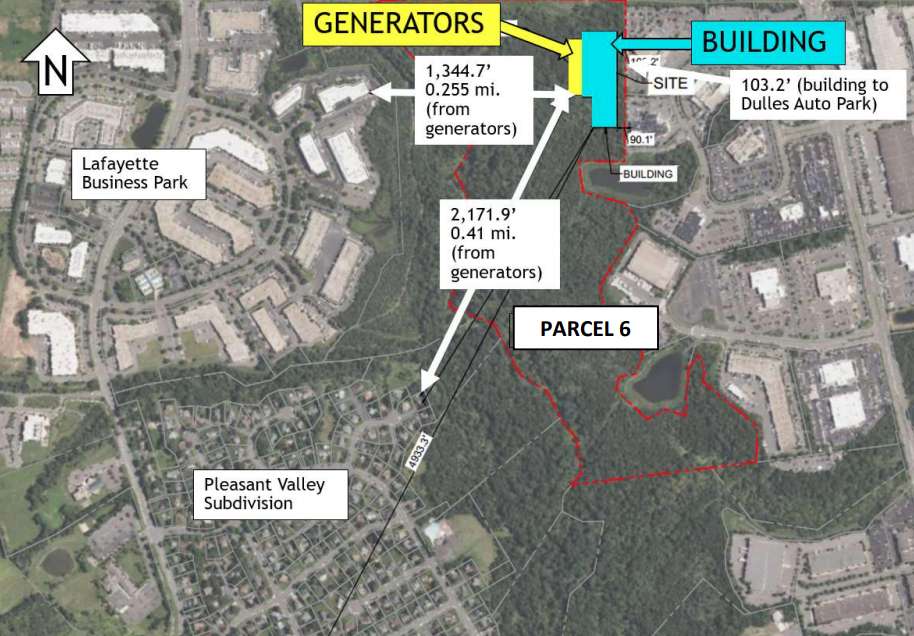
The developer plans to install noise buffers and silencers on equipment and enclose the facility’s 27 diesel-powered generators, aiming to reduce external noise from the HVAC system and generators from the county’s limit of 60 decibels — equivalent to a normal conversation — to 50 decibels, akin to rainfall, per noiseawareness.org.
The developer must also carry out a noise study after the data center’s construction to ensure it complies with the county’s noise regulations.
Still, Brierly says he’s worried the generator and HVAC noise could lead to a loss of sleep and anxiety. Read More
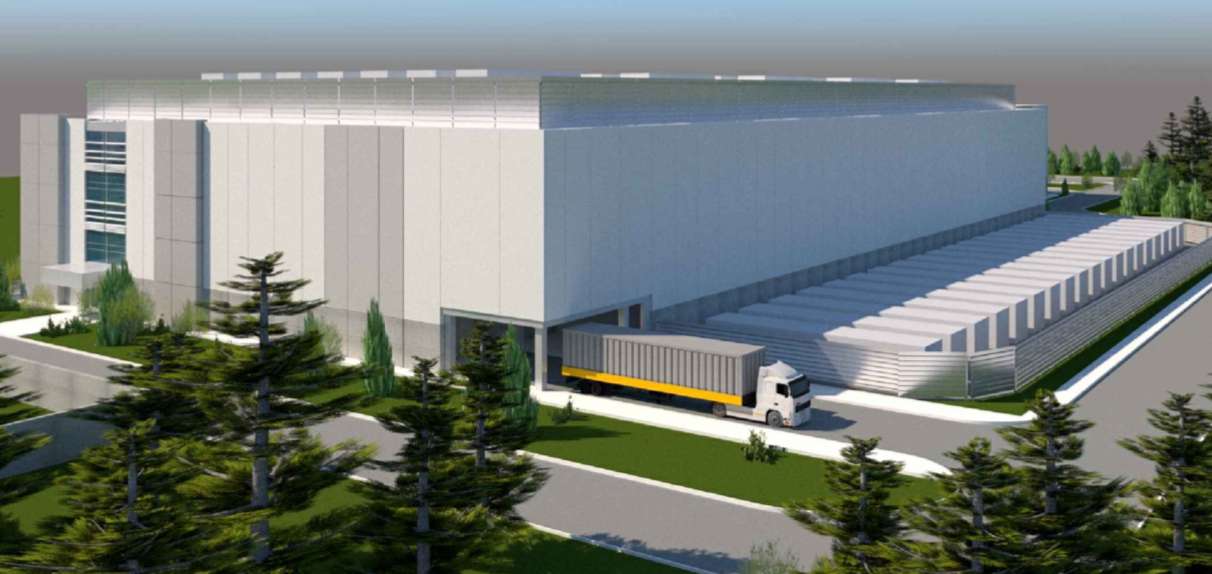
The Fairfax County Board of Supervisors is considering a proposal to rezone several acres near Chantilly Auto Park for a data center.
The project, however, faces strong opposition from several local stakeholder groups who are urging the board to delay approval until the effects of data center development can be further researched.
“We don’t yet understand the cumulative impacts of energy consumption, water usage, wastewater contamination, diesel fuel storage and exhaust filtration, and noise impacts on the environment, wildlife, and humans,” Jay Johnston, president of the Virginia Run Homeowner’s Association and member of the Sully District Council of Citizens Association, said in a press release. “It’s time for common sense to prevail and allow time to review and implement before we create further harm to ourselves and the environment.”
In September of last year, the Fairfax County Planning Commission recommended approval of an application to rezone a 12-acre plot of land off Route 50.
PDCREF 2 Chantilly LLC, an affiliate of the D.C.-based real estate investment firm Penzance, purchased the 3.4 million square-foot site in August 2022 for $10 million, per county land records. If approved, the developer would be allowed to build either a 150,000-square-foot warehouse or a 402,000-square-foot data center, ranging from 75 to 110 feet in height.
The proposal comes as data center development in the region has reached a breakneck pace. Northern Virginia currently hosts over 200 data centers spread out across Fairfax, Prince William and Loudoun counties, according to Datacenters.com.
Loudoun County currently has the largest concentration with about 175 data centers, followed by Prince William County with over 30. The Prince William County Board of Supervisors approved a 3-million-square foot development last month that would add 37 more data centers.
In contrast, Fairfax County houses under 30 data centers, per Datacenters.com.
The rapid expansion of data centers in Northern Virginia has raised concerns among many local residents and environmental groups, who warn of potential negative effects, such as increased carbon and noise pollution and high water and electricity usage.
Fairfax County began developing standards for the facilities last year, and at the state level, the General Assembly is considering several bills to create stricter regulations around data center development, such as requiring 90% of energy from non-carbon-emitting sources, maintaining certain energy efficiency levels, and mandating larger buffers between these facilities and nearby parks and residences.
While data centers have generated substantial tax revenue for local and state governments since 2017, local stakeholders argue the pace of development has been too fast, and regulatory oversight is lacking.
“The tri-county areas of Fairfax, Loudoun, and Prince William are, by all measures the largest concentration of data centers — in the world,” Johnston said in the release.
“No place in the world has a larger concentration been created, which places it close to the nation’s capital and the center of the free world and a prime target for those who wish to do US harm,” he continued. “Yet, we lag behind in regulations to control the growth or to manage what we currently have under construction because of some arcane rules that we can’t impose new regulation after submission of proposal to the county.”
The Board of Supervisors is scheduled to hold a public hearing on the Penzance proposal around 4 p.m. tomorrow in the Fairfax County Government Center (12000 Government Center Parkway). Johnston and other opponents, including the West Fairfax County Citizens Association and the Sully District Council of Citizens Association of Chantilly, plan to hold a press conference before the hearing at 3 p.m. to demand modifications to the proposal.
“The property is located in a drinking water supply protection area, near residential communities and an aircraft flight corridor — all threatened by the sheer size of the data center,” the release says.

Fairfax County’s efforts to establish more regulations for data centers are heating up.
With the industry continuing to grow in Northern Virginia, the Department of Planning and Development (DPD) presented guidelines on issues like noise, water and air quality, energy demand and aesthetics to the Board of Supervisors’ land use policy committee on Tuesday (Oct. 17).
Currently, the county allows data centers by right — meaning they only need administrative approvals instead of going through a public hearing process — in industrial districts, along with medium or high-intensity office districts and some special planned districts.
The zoning code that got re-adopted in May prohibited data centers in residential districts and added size, cooling, ventilating and equipment enclosures requirements.
Deputy Zoning Administrator Carmen Bishop said the county could consider establishing a maximum size that “would be allowed by right.” Larger sizes could be allowed with special exception approval.
“Now, of course, another option could be to require special exception approval for all data centers regardless of size,” Bishop said. “Other locational considerations could include setbacks, screening, additional screening requirements and other performance criteria.”
Data centers require generators, which can be noisy, according to county staff. To mitigate the noise impacts, Bishop said the county could consider requiring noise modeling, expanding existing equipment enclosure requirements and establishing standards for emergency generator usage and testing.
To protect water quality standards, the county could require monitoring before discharging to the wastewater system.
“If the monitoring indicates a need for pretreatment, then that could be required to be provided on-site,” Bishop said.
The DPD also proposed adding safety features for diesel handling and spill containment.
As for aesthetics, county staff suggested adding standards for facade differentiation, defined entrance features and screening.
Katie Hermann, the DPD’s environmental policy branch chief, said there could be added guidelines dictating LEED certification for data centers.
She said the county could also consider a salt management plan for exteriors spaces, maximizing tree preservation, and where applicable, establishing conservation easements or dedications to the Fairfax County Park Authority.
Loudoun County is the leading place in the country for data centers, with more than 100 projects, according to county staff. Fairfax County currently has at least 12 data centers, with five more in the pipeline and a controversial project in Chantilly nearing approval.
Research found that the demand for data centers is expected to double from 2022 to 2030.
Next Thursday (Oct. 26), the DPD will meet with the Fairfax County Planning Commission’s land use process Review Committee. Then, the department will put together a final report to submit to the board by December.
“We envision the board potentially directing staff to prepare proposed amendments to the comprehensive plan and or the zoning ordinance and those amendments would go through their own process, including public hearings before the Planning Commission and the board,” Hermann said.
Photo via Jordan Harrison/Unsplash
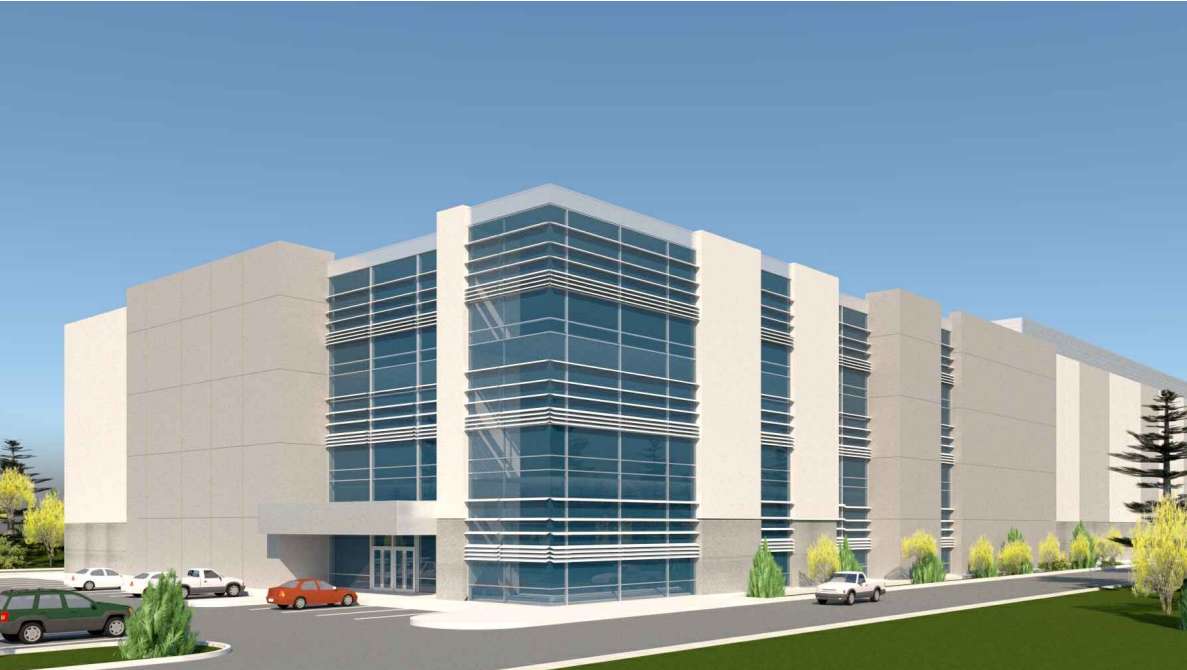
Over vocal protests from members of the public, the Fairfax County Planning Commission recommended approval of a plan to build a data center in Chantilly.
Following a five-hour public hearing that started on Sept. 20 and ended well past midnight on Sept. 21, the recommendation passed with six votes in favor, including from Evelyn S. Spain, who represents the Sully District where the data center would be built.
Peter Murphy (Springfield), Mary Cortina (Braddock) and John Ulfelder (Dranesville) abstained. Candice Bennett (at-large) and John Carter (Hunter Mill) did not attend the meeting, and Timothy Sargeant (at-large) recused himself.
Pending approval from the Board of Supervisors, the plan would likely lead to a data center up to 110 feet tall on a 12.1-acre plot of land on the south side of Route 50, built by an affiliate of D.C.-based Penzance.
The developer could opt to build a 150,000-square foot warehouse on the site instead, but attorney Evan Pritchard, representing the developer, said a data center was the more likely outcome.
This recommendation comes after months of discord over the project and amidst a broader debate over data centers in the county. Ultimately, county staff concluded that a data center or warehouse was an acceptable use for the land in question.
“Overall, considering the Comprehensive Plan, industrial designation, the adjacent uses, which are industrial, commercial and open space, and the significant setbacks and buffering around the property, as well as other items discussed in the staff report, staff consider this an appropriate area for a data center or a warehouse and either use compatible with the surrounding area,” said Emma Estes with the zoning and evaluation division of the county’s Department of Planning and Development.
Residents of Chantilly’s Pleasant Valley neighborhood raised concerns about topics including noise, potential diesel spills and the character of the area.
“It is just beyond my comprehension that anyone would consider this enormous building within character and harmonious with the surrounding area, yet that is exactly what the county is trying to convince us of,” Cynthia Shang said on behalf of the community organization Save Pleasant Valley.
The data center would house an estimated 27 diesel-powered backup generators that use about 135,000 gallons of diesel fuel, according to a county staff report, sparking concerns about the potential for an accidental spill.
Pritchard said the diesel-fueling areas were designed and graded to drain away from stormwater areas and the resource protection area, and fuel would collect at an oil-water separator in the event of a spill.
“Needless to say, this is a very regulated area,” Pritchard said. “We’ll be subject to the federal [Environmental Protection Agency] regulations, the Virginia [Department of Environmental Quality] regulations as well as the county’s own regulations on fuel tank storage.”
As the committee voted, some members of the public still in attendance shouted their opposition. Commission Chairman Phil A. Niedzielski-Eichner (Providence) voted in favor of recommending approval, but acknowledged the discontent with the developer.
“I’m a strong proponent of engaging people, not being afraid of people,” he said. “That dynamic here does not cloud for me the fact that I believe the criteria that’s important to me relative to the neighborhood has been addressed.”
Spain said it was “very painful” and “a very difficult situation” as she moved for the commission to recommend approval.
Some commissioners asked if the vote could be deferred, but according to county staff, state law requires a planning commission recommendation within 100 days of a rezoning case’s referral. Without a vote, the plan would’ve progressed to the Board of Supervisors with an automatic approval recommendation.
The proposal will now get a public hearing before Board of Supervisors at 4:30 p.m. on Oct. 24.
A planned data center on the south side of Route 50 near Stonecroft Blvd is already stirring up some controversy, well ahead of a hearing before the Fairfax County Planning Commission.
An affiliate of Penzance, a D.C.-based firm, is seeking the county’s permission to rezone a nearly 12-acre piece of land to develop one of two options: a 402,000-square-foot data center or a 150,000-square-foot warehouse.
Sully District Supervisor Kathy Smith said a Fairfax County Planning Commission meeting originally set for June 28 has been deferred. She plans to host a community meeting sometime in July.
“The applicant did not reaffirm their affidavit in time,” Smith said regarding the hearing’s deferral.
To move forward with the plan — called Chantilly Premier — the county would have to rezone the property from a split zoning of light and heavy industrial uses and commercial uses to industrial uses with a higher developmental intensity.
Although the proposed data center would exceed the recommended intensity of uses outlined by the county, staff said that increased intensity was justified because the land is located in the Route 28 Special Tax District.
The applicant also wants a special exception to increase the allowed height of the data center from 75 feet to 110 feet, arguing that the added height is necessary to accommodate rooftop equipment and screening.
The data center option would include 50 parking spaces to the south of the three-story building, four loading spaces, and an 8-foot-tall security fence within the outside of an environmentally sensitive area.
The second option for a warehouse would include 150 parking spaces, a loading dock with 30 spaces, trailer parking, and a stormwater bio-retention area. The applicant would also pursue LEED green building certification for the warehouse.
The proposal has already gained opposition from residents of the Pleasant Valley neighborhood in Chantilly.
Cynthia Shang, who lives in the community of more than 500 single-family homes, said the neighborhood has serious concerns about the proposal’s intensity, incompatibility, and environmental impacts.
“Our top concern is that our representatives are rubber stamping these data centers with little regard for the negative impacts to the residents’ quality of life and the environment,” she told FFXnow by email. “Neither the data center nor the ‘fallback’ parcel distribution warehouse (which would require air and noise polluting diesel fueled semi-trucks to U-turn at Pleasant Valley, endangering our student drivers going to Westfield HS) are appropriate for the environmentally sensitive area.”
At the requested height, the data center would dwarf surrounding buildings, Shang said. She’s also concerned about noise generated from 115 exhaust fans, 18 air handling units and 20 diesel generators, along with potential impacts of having diesel and exhaust fluid near environmental sensitive areas.
“That amount of diesel and exhaust fluid immediately adjacent to the Comprehensive Plan’s sensitive environmental areas, including a tributary that flows to the Occoquan Reservoir that supplies our drinking water, should not be acceptable,” she wrote. “Accidents and fires happen. This upzoning to accommodate data centers must stop.” Read More

As Northern Virginia continues to cement its position as a global base for data centers, Fairfax County leaders say the time has come to reevaluate the impact of the facilities and, potentially, set some boundaries for the future.
At its meeting this morning (Tuesday), the Board of Supervisors directed county staff to research environmental issues linked to data centers and what’s being done to address them. Staff will also develop guidelines for site locations and the process for approving them.
The unanimously approved motion introduced by Board Chairman Jeff McKay advised staff to report back by the end of this year, but with more centers in the works, some supervisors suggested an accelerated timeline is needed.
“The technology’s changing, the practices are changing, so there may be some things that we need to do even sooner than the end of the year,” Hunter Mill District Supervisor Walter Alcorn said. “I would just encourage us to be flexible and staff to bring things forward when ready.”
Though Silicon Valley remains synonymous with the tech industry, the internet lives in Virginia, which hosts about 35% of the world’s data centers — including 45 million square feet just in Northern Virginia, according to a recent report by real estate developer JLL. As much as 70% of all online traffic passes through Loudoun County, giving it the nickname “Data Center Alley.”
Fairfax County currently has 11 data centers with five more “in the pipeline,” according to McKay. Alcorn said four of the upcoming sites are in his district, which includes the CoreSite campus in Reston and offices for Amazon Web Services (AWS) in Herndon.
With AWS pledging to invest $35 billion for new data center campuses in Virginia, the facilities could “be beneficial from a tax-base perspective and perhaps even a building repurposing perspective,” McKay said in his board matter, which was also sponsored by Mount Vernon District Supervisor Dan Storck and Sully District Supervisor Kathy Smith.
“The region continues to receive requests for more data centers due to our unique location related to the internet’s fiber infrastructure,” McKay said.
However, as the industry’s footprint has grown, so have concerns about the consequences for the environment, local neighborhoods and the power grid.
Citing their impacts on air and water quality as well as electricty usage and greenhouse gas emissions, the county’s Environmental Quality Advisory Council (EQAC) urged the board to develop a plan requiring data centers to use renewable energy “to the extent feasible” and report all emissions and pollutants.
“Actions to mitigate threats to community health and minimize the need for future cleanup of water by County wastewater treatment facilities and Fairfax Water should be undertaken,” EQAC Chair Larry Zaragoza said in the March 13 memo. “Moreover, these steps are important to provide the data centers with clear expectations to reduce environmental impacts.”
The proposed data center plan will build off of updates in the county’s recently voided zoning ordinance, which was scheduled for a public hearing and potential re-adoption today. Read More

A West Coast company has officially leased data center space at 12100 Sunrise Valley Drive in Reston.
According to the Washington Business Journal, which first reported the deal, Backblaze, a San Mateo-based company, is occupying part of space that owned and run by CoreSite, a information technology company that’s based in Denver.
Victor Hoskins, president and CEO of the Fairfax County Economic Development Authority, says the lease offers further “validation” that the county is a choice location for strategic data center use.
“Data centers are choosing Fairfax County for great reasons — real estate availability, power availability, technical talent pipeline, proximity to customers, and our pro-business approach,” he told FFXnow. “The diversity of our business base, which includes data centers, is one of our greatest strengths and has a direct impact on our thriving and stable economy here in Fairfax County.”
CoreSite’s Reston data center is part of a campus with more than 1.3 million square feet of colocation space at full build-out, according to the company.
The campus can reportedly provide access to “any cloud, network or managed service providers you need to support your digital transformation journey in the U.S. and abroad.” It’s being marketed as an attractive alternative to Ashburn with tax incentives and commute options.
Here’s more from WBJ on the lease:
Backblaze started storing live customer data at the Reston data center on Dec. 7, said Gleb Budman, the company’s chair, co-founder and CEO. He said in an interview that his company had been eyeing an expansion into Northern Virginia because “it’s often considered the heart of the internet.”
Neither Backblaze nor CoreSite would disclose how much space Backblaze is occupying or any other terms of their agreement. Budman said only that the lease is a “multiyear” deal.
Backblaze typically uses third-party data centers and co-location facilities to store its customers’ information. One of its key services is allowing its customers to store data at one regional site and access it at another, and the Reston facility provides a closer option for Backblaze’s East Coast customers as well as a replication option for customers elsewhere, Budman said.
“When it’s full…we’ll have over an exabyte of customer data,” Budman said. (An exabyte is equal to one billion gigabytes. To put that into perspective, the average smartphone can store 64 gigabytes of data.)
Photo via Jordan Harrison/Unsplash

